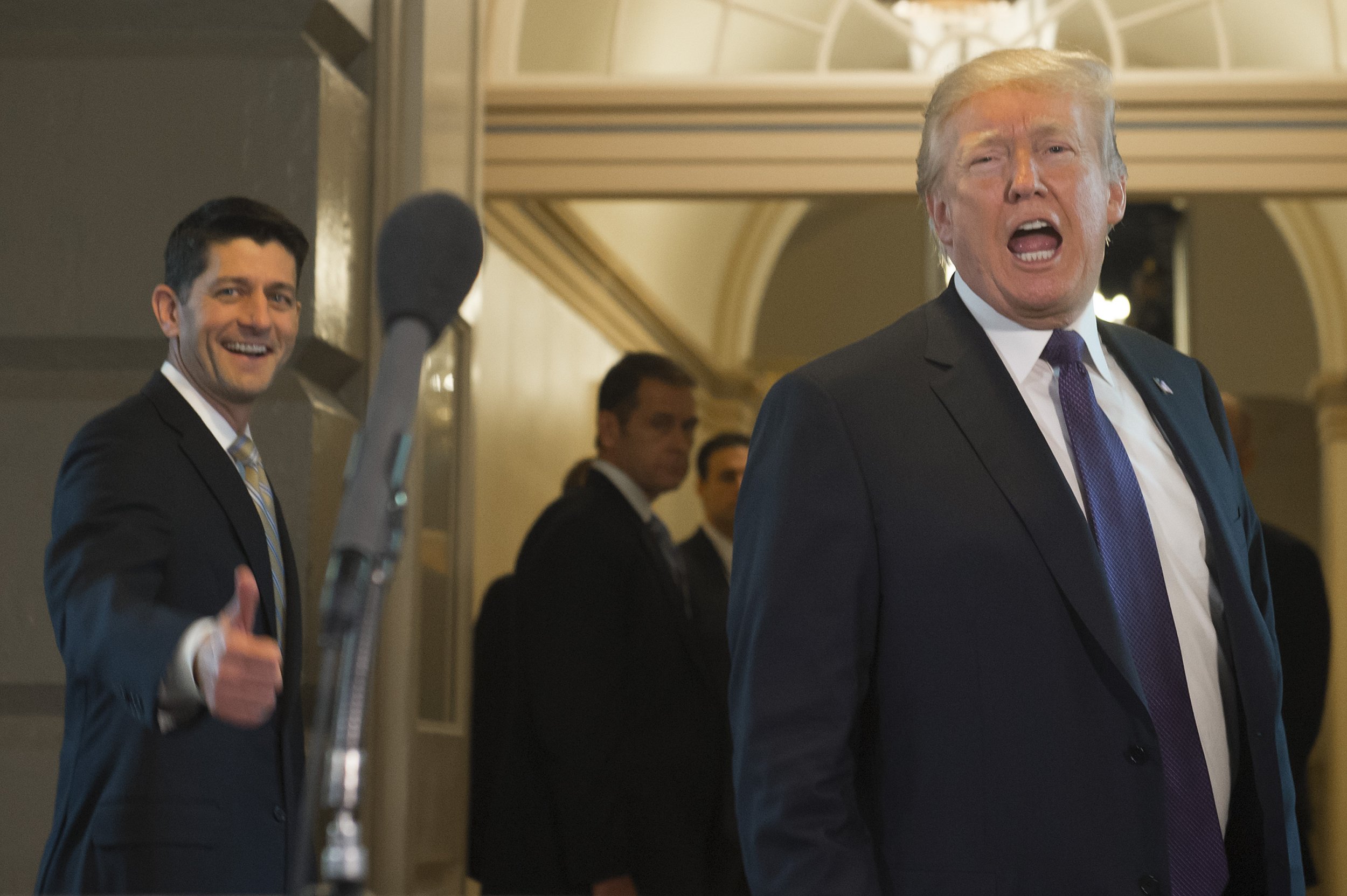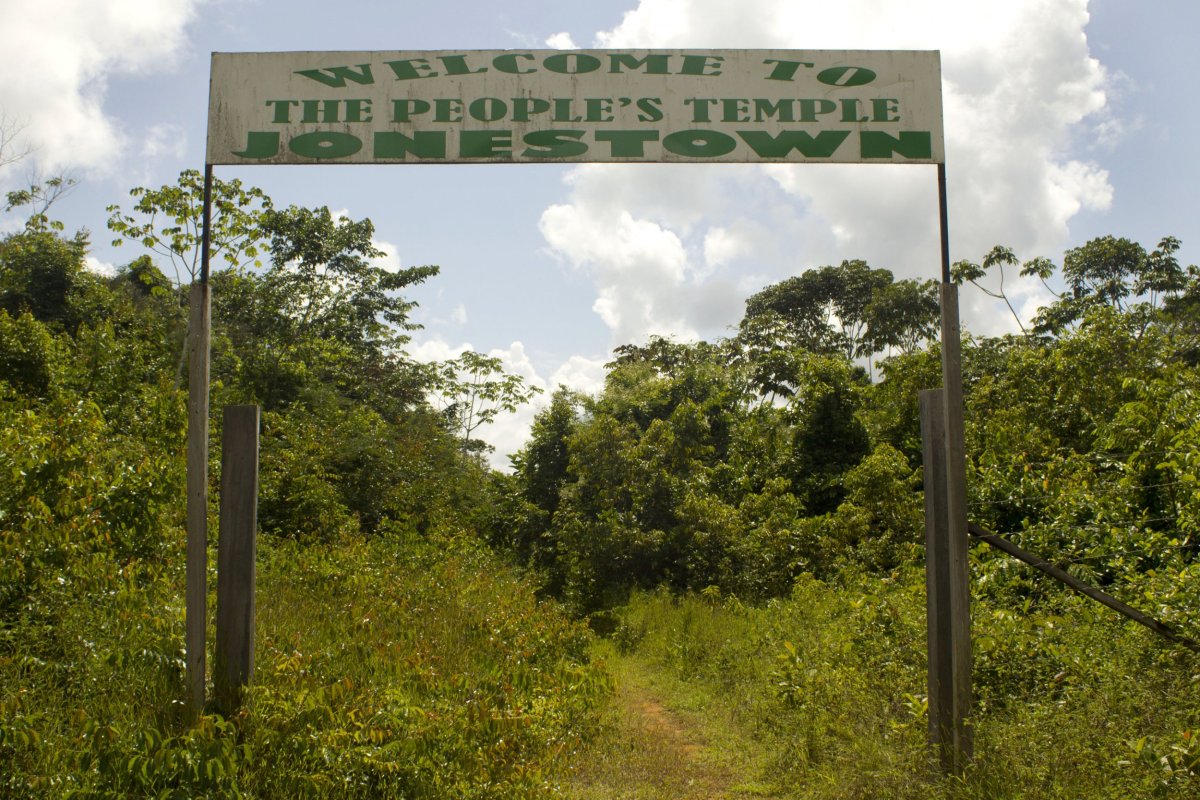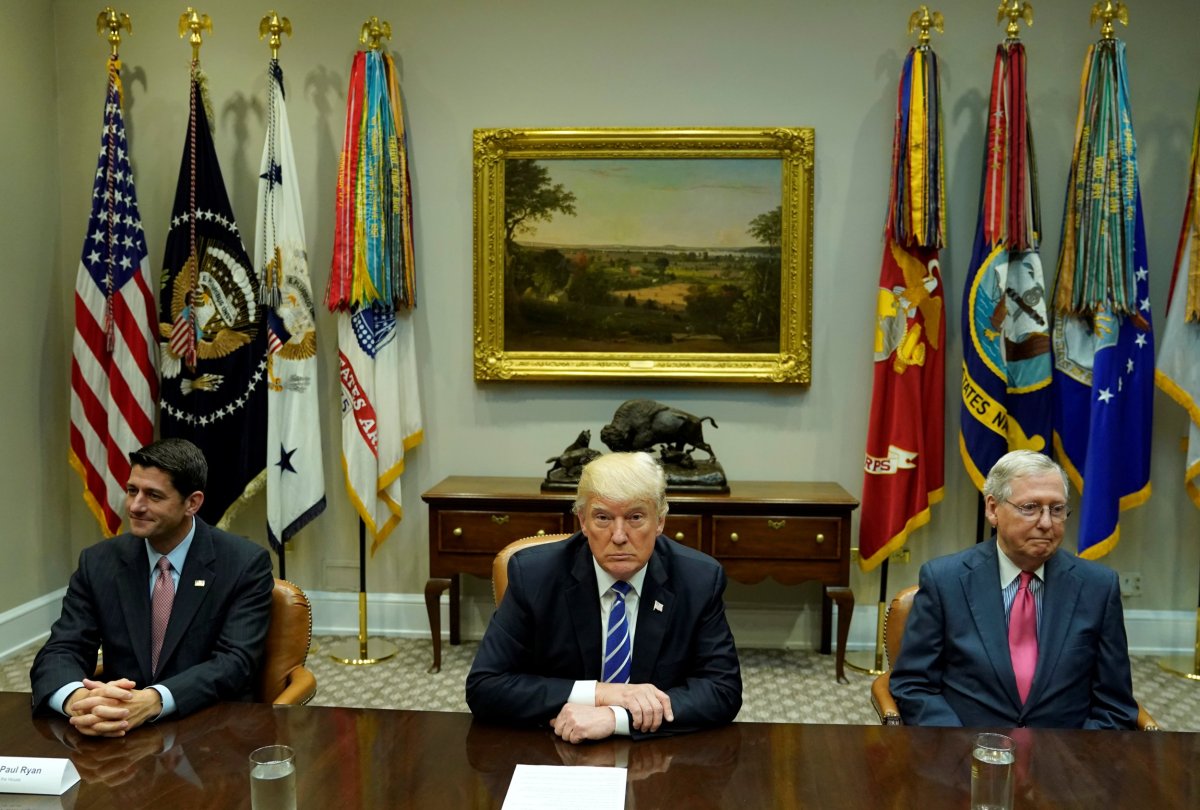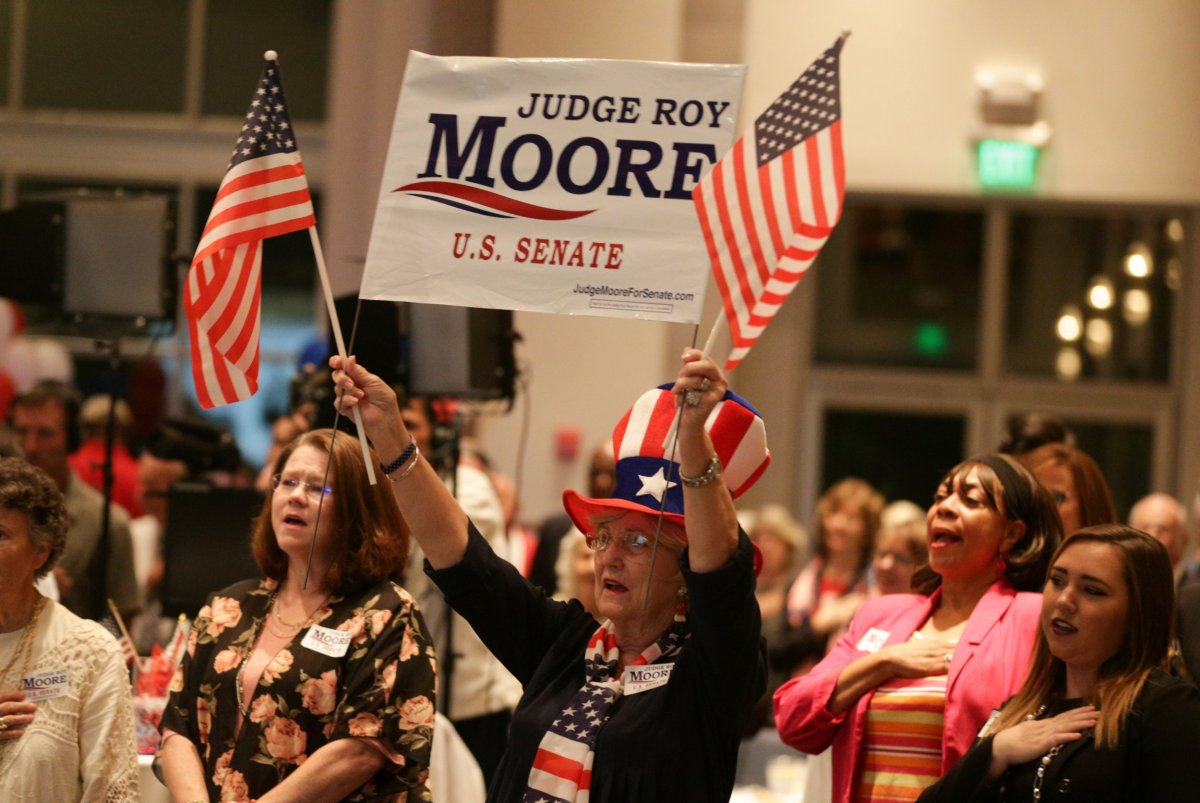
The prophet led the faithful into the jungle, where he promised they would find salvation. His self-regard was so great that he deemed even God a failure. "I'm a liberator; he's a fucker-upper," the prophet said. He made grandiose promises with confidence: "I know a place where I can take you, where there'll be no more racism, where there'll be no more division, where there'll be no more class exploitation."
That place was called Jonestown, a village hacked out of the jungle of Guyana. The Reverend Jim Jones did not manage to turn the settlement into the earthly paradise he'd promised his parishioners. In 1978, after a shootout that left visiting U.S. Representative Leo Ryan and four other members of a visiting delegation dead, Jones ordered his followers to perpetuate one of the most grotesque acts of mass murder in American history. "How very much I've tried my best to give you a good life," he opened his final sermon, laden with dark grievance, as 900 people prepared for their deaths. "But in spite of all of my trying, a handful of our people, with their lies, have made our lives impossible."

This gruesome story is the subject of an excellent recent book by Jeff Guinn, The Road to Jonestown, in which we see Jones, a Midwesterner with progressive ideas about economics and race relations, become increasingly deranged. But even as he drifted further into unreality, moving his church from Indianapolis to the redwood groves north of San Francisco, he continued to attract followers who saw in Jones the possibility of escape from a crestfallen nation, defeated in Vietnam, deflated by Watergate, fearful of Russian nukes. Jones was a charlatan, but he was also a master salesman who understood what people truly needed.
Guinn's book, published in the spring of 2017, proved "scarily relevant" for one reviewer, as well as for readers who saw in Jones the outlines of another, more recent salesman peddling greatness and redemption. Jonestown researcher Katherine Hill made the connection explicit in a 2016 essay titled "Jim Jones and Donald Trump: Same Kool-Aid, Different Vat," in which she notes the haunting temperamental similarities between the two men, right down to their affection for Russia.
Time now for the necessary and obvious caveats. Jonestown was a horrific act of homicide. No matter how much you dislike Trump, he is not Jim Jones. His impolitic tweets at North Korean despot Kim Jong Un notwithstanding, he does not harbor a death wish, either for himself or for the country. He probably has more compassion than his critics are willing to concede.
And yet his influence on the party he now leads may well prove the political equivalent of Jonestown. Having assumed control of the GOP, Trump may now destroy it: its national infrastructure, its fundraising capacity and, most of all, its support from the American public. A Gallup tracking poll in early October found that only 24 percent of respondents identified as Republicans. That's the lowest level of affiliation for the party in two years, a lack of popularity that is especially remarkable because Republicans control both the legislative and executive branches of the federal government.
It is far too early to say whether Trump's presidency will succeed or fail. He could yet, like Ronald Reagan, confound liberal critics who believe him unfit for the office he holds. A détente with North Korea could remind the public of his deal-making prowess. So could his promised $1 trillion infrastructure plan. Like Arnold Schwarzenegger when he was California's governor, he could make overtures to Democrats and increasingly govern as a centrist.
But whatever the case, the GOP appears to have made a fatal mistake in allowing itself to be seduced by his populism. All the glories of Trumpism will belong to Trump, while all the failures will be passed off to a hapless band he sometimes calls "the Republicans."

"Republican leaders have made a Faustian bargain with Donald Trump," says Will Marshall, founder of the centrist organization New Democracy. "Because Trump is not capable of articulating a clear or consistent ideology, my question is whether Trumpism can be institutionalized within the Republican Party," Marshall adds.
"My guess is not."
Like the jumbled pseudo-Christianity preached by Jones, the political philosophy of Trumpism makes sense only when embodied by Trump, a complex figure who embodies disparate, often clashing ideas: the aforementioned populism, for example, but also a veneration for wealth, isolationist talk interrupted by the sound of Patriot missiles crashing into a Syrian air base, overtures to evangelicals not accompanied by even the most cursory shows of Christian faith. Attempts by others to mimic his convictions have been pathetic, transparent and unsuccessful. In Virginia, Republican gubernatorial candidate Ed Gillespie, a creature of K Street boardrooms, ran a campaign of Southern racial grievance and anti-immigrant fearmongering. He lost by 9 points to Democratic Lieutenant Governor Ralph Northam a few weeks ago.
Some have grappled with the incongruities of Trumpism by pretending that Trumpism doesn't exist. Among these is New Criterion editor Roger Kimball, who claimed on the pro-Trump website American Greatness that "there no such thing as 'Trumpism.' Its putative author is constitutionally averse to the spirit that would give substance to the -ism."
As far as excuses go, this isn't a bad one. Trump is both the movement and the message. He gives the sermon, and the sermon is about him.
Many prominent Republicans believe their party has come to resemble the adherents of Jones, drifting ever further from reality. Trump, meanwhile, has shown no interest in reconciling the disparate factions of the GOP, hectoring leaders of his own party on Twitter as if they were obscure backbenchers, while cutting deals with "Chuck and Nancy," Democratic leaders Senator Charles Schumer of New York and Representative Nancy Pelosi of California. His former chief political strategist, Stephen Bannon, is waging war against Senate leader Mitch McConnell, Republican of Kentucky, while McConnell desperately seeks a way to quell Bannon's insurgent political movement, which he and other leading Republicans worry could hand the House of Representatives to the Democrats in next year's midterm elections.
The GOP "will face obliteration in 2018," says Republican strategist Steve Schmidt, who served as chief strategist on John McCain's 2008 presidential campaign. When we spoke recently, Schmidt blamed the party's fortunes on McConnell and House Speaker Paul Ryan, Republican of Wisconsin, a duo that he says "make Neville Chamberlain look like Churchill," a reference to the British prime minister famous for capitulating to Adolf Hitler in the Munich Agreement of 1938.
"You were given the choice between war and dishonor," Churchill said in response to Chamberlain's cowardice. "You chose dishonor, and you will have war." Republican leader appear to have similarly hurt their own longstanding agenda by surrendering to Trump, earning enmity from some for not challenging him more forcefully during the election and from others for not sufficiently supporting him as president.
The calculus of the Republican Party was cynical, and the effects of that calculation have been grotesquely plain. Although most Republicans understood that Trump as a candidate diverged from GOP doctrine on virtually all major issues, from reproductive rights to trade, they believed that once installed, he would do their bidding, effectively acting as a robo-signature on a cavalcade of conservative legislation.
His sermons, they assured, would end as soon as he sat down behind the Resolute desk in the Oval Office. Instead, he has led his flock ever deeper into the thicket, deviating flagrantly from conservative values by praising Russia, stifling free enterprise with a nakedly protectionist agenda and abrogating the party's moral foundations with behavior that has been called by many unethical and uncouth.
Bruce Bartlett, who served as a senior adviser to Ronald Reagan, told me he wishes there were a Republican who'd utter a basic truth: "Our party is being killed by these idiots" in the Trump administration. And a few have, including Senators Jeff Flake of Arizona and Bob Corker of Tennessee. They have both chosen to retire, however, aware that their anti-Trump positions would likely engender a ferocious primary battle.
Bartlett thinks fears of electoral defeat shouldn't discourage critics. "It's better for us to lose power for a generation than to continue this fraud."
Trump's takeover would have been impossible if the GOP's central ideology were not infested with intellectual rot. Bannon's "war" on the Republican establishment suggests that while Trump is unpopular, the Republicanism of Ryan and McConnell is toxic. Bannon has argued that it is Republican incompetence far more than Democratic intransigence that has hindered Trump's ability to govern.
Though Bannon would not comment on the record for this story, it seems quite clear that he believes that a purifying purge has long been in order for the GOP, and that any associated tumult is just the necessary side effect of such a cleanse.
Many Americans dislike Trump's vision for the nation, but they like the Republicans' vision even less. Only 17 percent of Americans supported the Republican efforts to repeal and replace the Affordable Care Act. While the Republicans refuse to enact any tougher gun laws, Gallup finds that 60 percent of American support stricter gun laws. The vast majority of Americans rejected the Republican tax cut plan, with support as low as 25 percent in some polls.
So while Trump's promises may be delusive, at least those delusions are new and intriguing. The delusions of McConnell and Ryan are stale. Their tax cuts are predicated on the Laffer curve, a laughably thin theory that forms the basis of trickle-down economics. It fell to Bartlett, the former Reagan adviser, to admit that correlations between tax cuts and economic growth were "a myth."
On gun control, we can look to Reagan, who wrote an op-ed in The New York Times in 1991 supporting the so-called Brady assault weapons ban, named after his press secretary, James Brady, injured in an assassination attempt on the president. Richard Nixon created the Environmental Protection Agency, ushering in a new era of regulation. George H. W. Bush raised taxes. So did Ronald Reagan, 11 times.
"Reaganism and Trumpism are not related," says Schmidt. "They have nothing to do with each other."
Trumpism's closest analog may be the politics ushered in by Newt Gingrich, the Republican from Georgia who became Speaker of the House in 1994, promising a conservative new era in American politics. That never came to pass, but the extremism of today originated in Gingrich's time as Speaker. He radically cut staffing while consolidating power in his office. Under his rule, congressional Republicans became more ideological, less willing to hear argument, spurning compromise for the sake of partisan purity.
The dark grandiosity of Trump was preceded by the just-as-dark grandiosity of Gingrich. "People like me are what stand between us and Auschwitz," the new speaker said in 1994. "I see evil all around me every day.''
Schmidt and Bartlett also complained about a primary system that, as Bartlett put it, has become "a chokepoint that allows strongly organized, intensely committed" factions to seize control of the electoral process. Data do not support that notion, but the fear is so pervasive that, as Bartlett puts it, establishment Republicans "live in fear of losing the primary." That has led to an astonishing 12 Republicans declaring they will not seek reelection to House seats in 2018. Bartlett explains why: "The job has just become so shitty."
But once you're in the jungle, the way out isn't easy. The vacated Republican seats may entice Bannon-funded candidates who are true believers in Trumpism. That could turn the marriage of convenience between DJT and GOP into a suicide pact. Insurgent candidates such as former Alabama chief justice Roy Moore, who has been accused of child molestation and sexual misconduct, could prove far more devastating than establishment incumbents who may not share Bannon's nationalist vision but will maintain Republican majorities in Congress.
Speaking last weekend in Arizona, unaware that a microphone had been turned on, Flake admitted to a fear shared by most of his establishment peers: "If we become the party of Roy Moore and Donald Trump, we are toast."
"It's increasingly hard to see how they recover from this," says Charles Sykes, the onetime conservative radio host who has left the party and written about it in How the Right Lost Its Mind. "By pandering to the Trumpists, they have isolated themselves from the majority of voters. And this association with Roy Moore will be radioactive."

Trump may do for conservatives what Stalin did for American radicals, forcing them to re-evaluate their convictions. The onetime eager socialists of City College in the century's first decades became the neoconservatives who formed the backbone of the Republican Party through the George W. Bush presidency: Irving Kristol, Norman Podhoretz, Henry M. "Scoop" Jackson. Their distaste for the cultural excesses of the 1960s, combined with a zeal for foreign military intervention, informed Republican thinking for half a century.
That is, until Trump came along. His may be a Pyrrhic victory, far more damaging to conservatism than a Clinton presidency would have been. Schmidt, the longtime Republican consultant, cites a recent American Psychological Association poll in which 59 percent of respondents agreed that we are currently in the "lowest point in our nation's history that they can remember."
Trump may try to blame Democrats for this dour national mood, but voters aren't likely to be fooled. "The Republican brand is shattered for the millennial generation and young people," Schmidt told me. "It's shattered for all time for Latinos, with African-Americans. And it's shattered not because of Trump's terrible behavior, but because of the absolute cowardice of the leaders of the Congress"
Others are determined to fight. Richard Painter, who served as the ethics lawyer for George W. Bush, wrote on Twitter that he intends to remain part of the loyal opposition to Trump. "I am staying a Republican," he wrote. "Will not let GOP be taken over by Russian collaborators, racists, pedophiles and outlaws. Will oppose all elected officials who do not stand up for the rule of law."
In response to that tweet, someone replied with the image of a tombstone for the Republican Party. The cause of death, the doctored tombstone declared, was Donald Trump.
Uncommon Knowledge
Newsweek is committed to challenging conventional wisdom and finding connections in the search for common ground.
Newsweek is committed to challenging conventional wisdom and finding connections in the search for common ground.
About the writer
Alexander Nazaryan is a senior writer at Newsweek covering national affairs.
To read how Newsweek uses AI as a newsroom tool, Click here.








